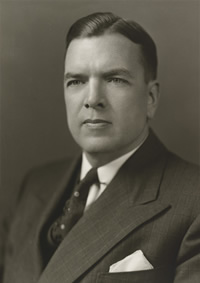
50 Years Ago: Nakai goes to federal court to remove Norman Littell

Norman Littell

Norman Littell
The fight between Navajo Tribal Chairman Raymond Nakai and the tribe’s general counsel, Norman Littell, continued in full force as 1965 began with the two battling it out in a federal court case held in Washington, D.C.
The story made front-page news throughout the last two weeks of January as Secretary of the Interior Stewart Udall tried to get the court to cancel Littell’ contract to work for the Navajos and Littell filed an injunction to stop it.
At the center of the case were allegations that Littell, without the knowledge of anyone in the tribe, changed provision in his contract to give him more money.
Littell had a contract to give him $35,000 a year – not a whole lot of money – but there were claims that he was also getting more money from special land claims he was handling for the tribe.
Nakai, one of the first witnesses in the case, testified that he had asked Udall to withhold Littell’s salary after he learned that changes had been made in his contract without council authorization.
He said that one of the changes made in the contract was to remove a provision that required Littell to pay for any extra legal help he needed in the land claims. As a result, said Nakai, he learned that Littell was using tribal attorneys who were supposed to only work on the tribe’s general legal matters.
This provision had been put in his contract, said Nakai, because he received a percentage of any land claims money the tribe received over and above his salary and therefore he should pay for part of he expenses.
Other witnesses revealed that the changes had been approved by former tribal chairman Paul Jones, who never bothered getting council approval.
Nakai eventually, under pressure from Littell’s supporters on the council, finally had to give Littell his pay but the fight generated a lot of talk on the reservation and not only divided the council but also many members of the tribe.
One of the witnesses after Nakai, Globe Ariz. attorney Barry DeRose said he felt Littel had taken advantage of the Navajos and should be removed from his job.
His testimony, however, was tarnished somewhat by reports that he wanted Littell’s job and was promised he could have it if Littell was removed.
Not true, said DeRose.
I wouldn’t take it if they offered it to me,” said DeRose, “at least I wouldn’t if I had to move to Window Rock.”
As January came to a close, Littell finally got a chance to give his side of the dispute and the first thing he did was tell the court that he never received any money on special land claims cases he handled for the tribe.
“Not one cent,” he said.
He testified that he didn’t know how much he might receive for fighting a battle on behalf of the Navajo Tribe for ownership of land within the Navajo-Hopi Land Dispute Area.
“I’ve dealt with complete forthrightness with the tribe on this and other matters,” he testified.
Littell said the only reason Udall is trying to get his contract cancelled is do he could give the job to his long-time friend – Barry DeRose.
As this hearing continued into February, Navajo officials learned some good news – the federal government decided to do something about the boarding schools on and near the reservation run by the Bureau of Indian Affairs.
By 1965, most of the boarding schools operated by the BIA were more than 50 years old and showing their age to the point where many of them were within an inspection of being condemned and declared unsafe for use.
So in January 1965, the BIA resent a proposal to Congress that would increase the agency’s budget from $54 million to $84 million with most of that extra $30 million going to construction of new schools or renovation of existing ones.
The increase received the hearty endorsement of Navajo Tribal Chairman Raymond Nakai who pointed out that the population of young Navajos going to school had skyrocketed during the past decade.
In total, the BIA plans to spend $44.5 million on school construction, up from $21 million appropriated in 1964.
“The time has come,” Nakai said, “for the BIA to carry out promises made to the Navajos in the Treaty of 1868 to provide for a decent education for our youth.”







 Highway 264,
Highway 264, I-40, WB @ Winslow
I-40, WB @ Winslow